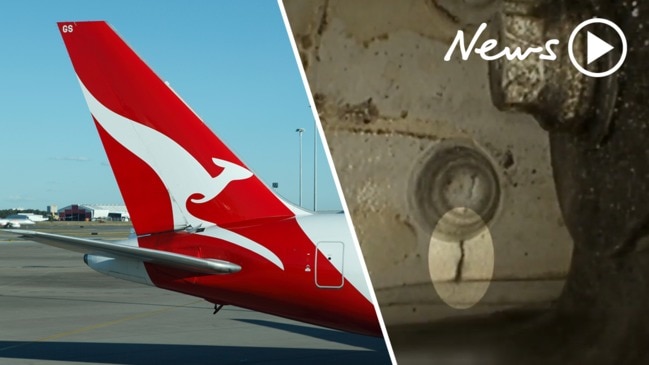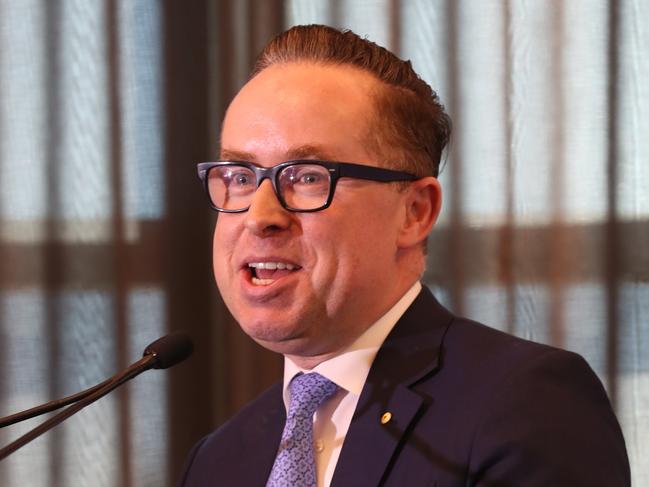Qantas, Virgin Australia face pressure to inspect entire Boeing 737 fleet after Lion Air crack discovery
Pressure is mounting on Qantas and Virgin Australia to check their entire fleet of Boeing 737s after cracking was discovered on jets that had not met the threshold for mandatory inspections.

Travel
Don't miss out on the headlines from Travel. Followed categories will be added to My News.
The engineers’ union has doubled down on demands Qantas inspects its entire Boeing 737 fleet after a low-cost Indonesian carrier found cracks in the “pickle fork” wing structure of two newer aircraft.
Lion Air this week found cracks in two Boeing 737s below the mandatory checking threshold of 22,600 landings, known as cycles, according to Indonesian media. Australian Licensed Aircraft Engineers Association federal secretary Steve Purvinas says this vindicates his belief cracks could be found in any 737 aircraft.
Qantas last week pulled three of its 75 Boeing 737s from service after finding pickle fork hairline cracks, but says it isn’t obliged to check other planes that have undergone fewer than 22,600 cycles.
The pickle fork is the structure between the plane’s wing and fuselage.

“Cracks can appear at any time in the life cycle of these aircraft and there’s no excuse why all airlines shouldn’t be checking them to make sure their aircraft are safe,” Mr Purvinas said.
“I wasn’t surprised at all that Lion Air had found cracks on aircraft below the 22,000 threshold.
“What did surprise me was that a low-cost carrier in Asia was actually checking these planes and Qantas, who says they put safety first, refused to check theirs.”
Qantas has checked all 33 of its 737s with more than 22,600 flights, but Mr Purvinas wants Qantas to check the remaining 42.
“It’s inevitable that they’re going to find some cracks on the other 42 they haven’t checked,” he said.
News Corp has contacted Qantas and Virgin Australia for comment.
While Virgin has found no cracks in its 19 aircraft checked above 22,600 cycles, Mr Purvinas also wanted Qantas’ main rival to check all its 737s.
The US Federal Aviation Administration earlier this month ordered airlines to check withina week any 737s that had completed more than 30,000 cycles. Planes with more than 22,600 cycles must be checked within seven months.
“They’ve already checked all of their aircraft over 18,000 flights, but like Qantas they too should check all of their aircraft, as should every airline in the world,” he said.

Qantas last week said the three affected planes would return to service by the end of the year, and the airline would work to minimise passenger disruption.
“Qantas will never fly a plane if we do not believe it is safe to do so,” Qantas Domestic chief executive Andrew David told reporters in Sydney.
“Our entire reputation - our brand - is built on our safety record.”
It comes after news emerged yesterday that European budget airline Ryanair grounded at least three of the Boeing 737 jets.
All were more than 15 years old, according to The Guardian.
QANTAS SET TO SLASH MORE JOBS
Qantas has announced it is planning several redundancies, due to a slowdown in the economy.
Most of the roles expected to be affected are in middle management, Nine News reports.
Qantas has not revealed a specific number for the job cuts.
The news comes after Virgin Australia revealed it will retire five ageing aircraft and reduce domestic capacity by 2 per cent in the first half of next year as it focuses on more profitable routes.
The news come as Qantas has confirmed it plans to replace its entire domestic fleet by the end of 2020.
Virgin also said it would suspend its Melbourne to Hong Kong flight, which has underperformed with recent protests in the former British colony, and redirect the A330-200 aircraft on a new route between Brisbane to Tokyo.

Chief executive and managing director Paul Scurrah told shareholders at Virgin’s annual general meeting today that the Tokyo flight was a “great opportunity”.
The airline will begin flying from Brisbane to Tokyo’s Haneda Airport by the end of March, the airline tweeted.
The 2020 Olympics begin in Tokyo in July.
Virgin said it would retire two A320s from its Tigerair Australia subsidiary and three Fokker 100s from its regional business.
“Flying to the right destinations, with the right customer demand, and the right sized fleet with improve our financial performance,” Mr Scurrah said. There were many instances where

Virgin Australia and Tigerair both have had aircraft operating on the right routes at the same time, he said. The company is looking to refocus Tigerair flights on key holiday destinations, he said.
Virgin Australia is trying to reduce costs after an underlying loss of $71.2 million last financial year.
Originally published as Qantas, Virgin Australia face pressure to inspect entire Boeing 737 fleet after Lion Air crack discovery
